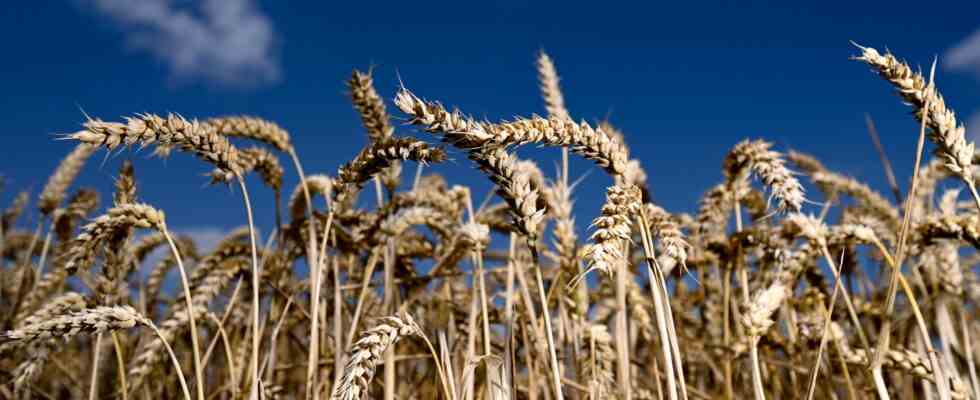Status: 07/13/2022 1:18 p.m
Because of the Russian blockade of its ports, Ukraine is trying to find other ways to export grain – for example via the Danube. However, Ukraine does not see this as more than an interim solution. She is hoping for a meeting in Istanbul.
Before the war, Ukraine was one of the world’s largest exporters of wheat and other grains. Ukrainian farmers recently stated that because of the war they were exporting half less grain every month than in peacetime. Denys Marchuck from the Ukrainian Agriculture Council speaks of grain exports of around five to six million tons per month before the war. In June it was now about 2.2 million tons. According to Marchuk, these are losses that cannot be made up for.
The main reason why Ukraine is currently exporting so much less grain is that Russia is blocking Ukrainian ports. In peacetime, most of Ukraine’s grain was exported across the Black Sea through these very ports.
Export of grain via the Danube is to start
Because of the blockade, Ukraine is now trying to export its grain through other routes – for example through the ports of Romania, Lithuania and Poland or through the Danube. According to government information, the country can export grain by ship – despite the Russian blockade of the Black Sea ports.
According to the Ukrainian Ministry of Infrastructure, 16 merchant ships have already passed through the mouth of the Danube Delta. They could now be loaded with grain. This is happening in the three Ukrainian Danube ports. This was made possible thanks to the liberation of Snake Island, the Ukrainian side said. Ukraine recaptured the island at the end of June – and has thus regained control of the Danube Delta and the access to the sea.
More than 90 other ships are waiting in the Romanian Sulina Canal, another branch of the Danube. According to Deputy Infrastructure Minister Yuri Waskov, only four ships per day can be handled on the Sulina route. However, eight ships per day are needed to export grain. Ukraine is therefore negotiating with its Romanian colleagues and representatives of the European Commission to increase transit capacity. In addition, regular traffic jams at the Danube ports are problematic.
Rail could soon become too expensive
Most recently, many Ukrainian grain exporters had attempted to ship all or part of their deliveries to Europe by rail – to end customers in the EU, but also to reach the ports of Romania, Lithuania and Poland and the grain from there to Africa and Asia to transport.
However, this export route could soon become too expensive. The reason for this are plans by the Ukrainian railways to raise prices for grain exports. As a result, some companies fear closures. More than a third of farms are threatened with bankruptcy, says Martschuck from the Agricultural Council:
If the ports don’t open in the near future and the Ukrainian railways don’t revise their tariffs, about 30 to 40 percent of agricultural producers across Ukraine will simply be forced to shut down their businesses.
Truck exports cause traffic jams
Even with truck transport, the pre-war quantities of grain could not be exported. The reason for this is that the customs infrastructure is not sufficiently developed, according to the country’s Ministry of Infrastructure. This leads to long queues at the border crossings.
Topic overview
war in Ukraine
Burning fields in southeastern Ukraine
In addition, the work of farmers in Ukraine has been severely impaired or even impossible as a result of the war. In the Zaporizhia region in the southeast of the country, wheat fields are said to have burned. Apparently they burst into flames after being shot at. Eyewitnesses and activists released footage of ears of wheat burning in an area the size of 28 football pitches.
Many fields are also littered with projectiles and mines. Therefore, farmers must plow and harvest under fire and avoid mines. This is particularly bitter for central Ukraine and the south, because the soils there are considered to be particularly fertile.
There are hopes that the blockade will be cleared
Because alternative export routes are cumbersome and expensive, lifting the port blockade is considered crucial for grain exports in Ukraine. It’s not just about exporting the grain, but also about emptying the stores for the new harvest. Otherwise, farmers fear having to leave the fresh grain on the fields.
Hopes are therefore pinned on a meeting in Istanbul at which representatives from Russia, Ukraine, the United Nations and Turkey will discuss a possible resumption of grain deliveries via the Black Sea today.
With information from Palina Milling, for the ARD studio in Moscow, currently in Cologne
Ukraine War: Grain Export Efforts
Palina Milling, WDR, 13.7.2022 10:56 a.m

